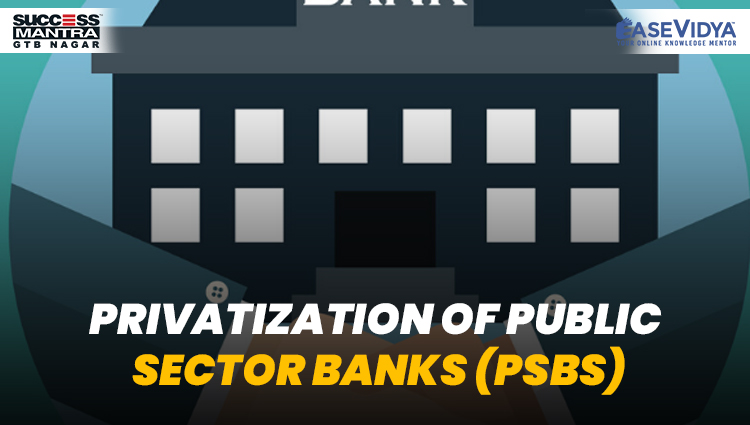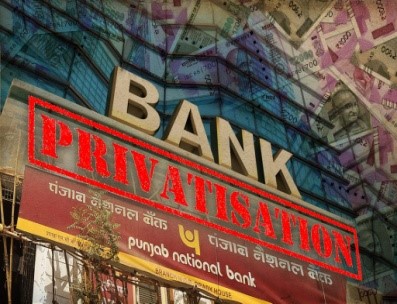
PRIVATIZATION OF PUBLIC SECTOR BANKS
PRIVATIZATION OF PUBLIC SECTOR BANKS (PSBs)

As an institution, Public Sector Banks (PSBs) are vehicles of the Indian economy’s growth and development, and they have become the trustees of people’s savings and confidence. The PSBs played a huge role in making the country self-sufficient by supporting the green, blue, and dairy revolutions. They have also contributed significantly to infrastructural development. Govt-owned banks not only provide a tremendous comfort level to depositors but also render services at affordable cost. However, the idea of privatisation has come up to deal with the issues of PSBs has several challenges.
Current Affairs Notes By Success Mantra Coaching Institute GTB Nagar Delhi CLICK HERE
IMPORTANCE OF PRIVATE SECTOR BANKS
- The private sector banks play a vital role in the Indian economy. They indirectly motivate the public sector banks by offering healthy competition. The following are their importance:
- Offering High Degree of Professional Management: The private sector banks help in introducing a high degree of professional management and marketing concept into banking. It helps the public sector banks as well to develop similar skills and technology.
- Creates Healthy Competition: The private sector banks provide a healthy competition on general efficiency levels in the banking system.
- Encourages Foreign Investment: The private sector banks especially the foreign banks have much influence on the foreign investment in the country.
- Helps to Access Foreign Capital Markets: The foreign banks in the private sector help the Indian companies and the government agencies to meet their financial requirements from international capital markets. This service becomes easier for them because of the presence of their head offices/other branches in important foreign centres. In this way they help a large extent in the promotion of trade and industry in the country.
- Helps to Develop Innovation and Achieve Expertise: The private sector banks are always trying to innovate new product avenues (new schemes, services, etc.) and make the industries achieve expertise in their respective fields by offering quality service and guidance. They introduce new technology in the banking service. Thus, they lead the other banks in various new fields. For example, introduction of computerised operations, credit card business, ATM service, etc
PRIVATIZATION NOT A PANACEA

Non Performing Assets is Universal Challenge: The major problem faced by banks is on account of non-performing assets, which is common for both the private and public sector banks. The government may also have difficulty in providing additional capital to the government banks on account of fiscal constraint and the banks are in need of additional capital to maintain Capital Adequacy Ratio for continuing their lending operations. But getting rid of public sector banks on account of such problems is akin to throwing the baby out with the bathwater.
Failure of Private Sector Banks: Bank nationalisation ushered in a revolution for India’s banking sector. Before nationalisation, barring the State Bank of India, most banks were privately owned and they largely benefited the rich and the powerful. The nationalisation of 14 private banks in 1969, followed by six more in 1980, transformed the banking sector, created jobs, extended credit to the agriculture sector and benefited the poor areas that had so far been neglected, including agriculture, employment-generating productive activities, poverty alleviation plans, rural development, health, education, exports, infrastructure, women’s empowerment, small scale and medium industry, and small and micro industries, became priority sectors for these banks.
PRAVAHINI Current Affairs Notes By Success Mantra Coaching Institute GTB Nagar Delhi CLICK HERE
GOVERNANCE ISSUES
ICICI Bank MD and CEO was sacked for allegedly extending dubious loans. Yes Bank CEO was not given extension by the RBI and now faces investigations by various agencies. Lakshmi Vilas Bank faced operational issues and was recently merged with DBS Bank of Singapore.
Under Reported NPAs: When the RBI ordered an asset quality review of banks in 2015, many private sector banks, including Yes Bank, were found under-reporting NPAs.
OTHER POINTS TO REMEMBER

- Penalising Willful Defaulters: There is an urgent and imperative need to bring in a suitable statutory framework to consider wilful defaults on bank loans a “criminal offence”. A system to examine top executives of PSBs across the country will also help in improving accountability.
- Improving the Governance: The governance and management of PSBs has to improve. The way to do this was outlined by the PJ Nayak committee, which recommended distancing between the government and top public sector appointments (everything the Banks Board Bureau was supposed to do but could not).
- Reduce the Number of Mandates for PSBs: By now, the well-established one is debt waiver for farmers. They need a lot of help from the government but debt waiver, which eats away at repayment culture, is not one of them. It is equally pernicious to subject banks to mandated lending. Right now, they are being exhorted to lend to MSMEs.
- Utilising Infrastructure: Placing such a huge network of bank branches and the infrastructure and assets in the hands of private enterprises or corporates may turn out to be an irrational move.
- It could lead to denial of convenient and economical banking services to the common man; the risks of monopoly and cartelisation may only complicate the issue. Thus, it is more appropriate to utilise the already in place infrastructure.
- De-Risking Banks: There is a need to follow prudential norms for lending and effective resolution of NPAs. In this context, the establishment of the bad bank and speedy resolution of NPAs through the Insolvency Bankruptcy Code steps in the right direction.
- Corporatization of PSBs: Rather than blind privatization, PSBs can be made into a corporation like Life Insurance Corporation (LIC). While maintaining government ownership, will give more autonomy to PSBs.
- Thus, merely privatising PSBs will get it nowhere. A whole lot of intricate sector-specific reforms must also be carried through to get useful results.












0 Comment